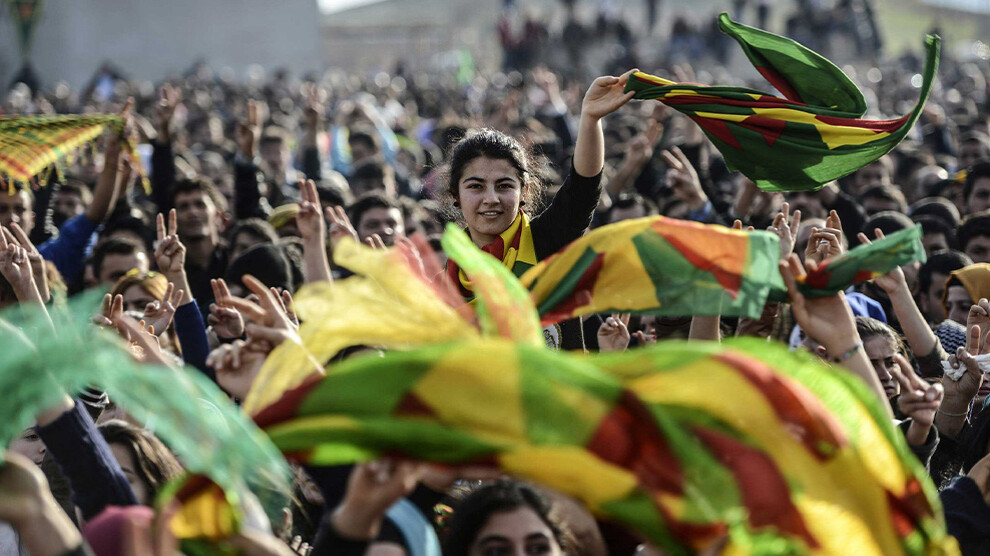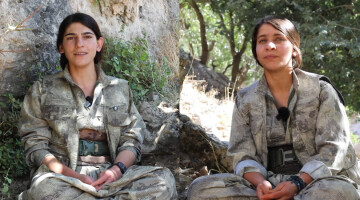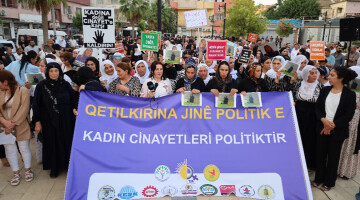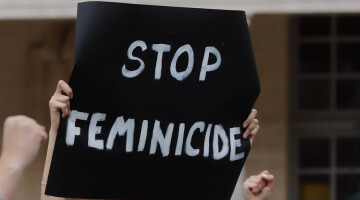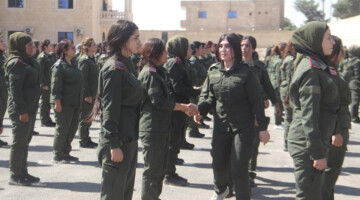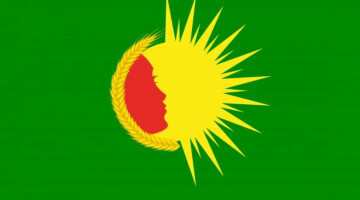The Commission on Women of the Kurdistan National Congress (KNK) released a statement marking March 8, International Women’s Day.
“Let us make every day March 8th. The future can only be saved if it is female”, said the KNK statement, which provides an overview of recent developments for women in Kurdistan and the Middle East along with background information on the Kurdish women’s movement and its ongoing resistance to all forms of patriarchal domination.
The statement by the KNK Commission on Women includes the following:
“Wars are increasing across the globe, and with conflict between Russia and Ukraine the carnage has reached European territory. Political developments also show that freedom and democracy are under threat, alongside their foundational pillars of international law, human rights, women’s rights, and state sovereignty. In this new era, the law of the strongest reigns.
Exploitation and oppression due to the crisis of the capitalist system were the genesis of March 8th and the international women’s struggle. As in the 20th century, women no longer expected anything from states and the patriarchy, as they knew these were the cause of their subjugation. The 8th of March, therefore, is a symbol of women’s rebellion and revolution against all kinds of oppressive systems.
In Kurdistan, every day is March 8th
The 8th of March is an international day of struggle against patriarchal, capitalist, and nationalist wars. However, every day must be lived like the 8th of March, as the other 364 days of the year also deserve our unwavering commitment for equality. The hegemonic powers of the world who hope to starve the souls of Kurdish women will not win. Their oppression has brought about a renaissance, which will spread throughout not only Kurdistan, but the entire Middle East and then the World. Indeed, every global woman shares a common bond in this struggle and any victory for one of us, is a triumph for all of us. But we should not expect freedom and peace to just be given to us, we must seize it with all of our spirit.
Kurdish Women: Double oppression requires double revolution
The political analysis of the Kurdish women’s movement, which emerged as a result of the Kurdish leader Abdullah Ocalan’s political strategy and analysis, has prepared Kurdish women for the upheavals of the 21st century. Kurdish women learned from the tragic history of Kurdistan that they have to fight a dual struggle, since the colonial powers occupying Kurdistan used genocide against their ethnic identity and feminicide against the gender identity.
The Kurdish women’s movement speaks of feminicide as a comprehensive, structurally anchored war against women – both in armed conflict and in everyday life. This war takes place on a physical military level, as well as on an ideological, social, and psychological level. As a result, for years the Kurdish women’s movement has asked the UN to recognize femicide as a form of genocide.
Due to this double revolution strategy, Kurdish women are determined to stand against the nationalism of the ruling elite and male dominance within Kurdish society.
Simultaneously, the Kurdish women’s movement has shown the ability to defeat the misogyny of terrorist mercenaries like ISIS, while countering the hegemony of the regional and global powers hoping to control Kurdistan and the Middle East. In contrast to other liberation movements, the principle that Kurds can only truly be free when Kurdish women are free, has led to a genuine social revolution throughout Kurdistan.
Erdogan’s systematic feminicide
In recent years, Kurdish women have become the primary target of Turkish autocrat Erdogan and his extremist regime. Erdogan’s strategy is based on committing femicide in three of the four regions of Kurdistan, namely Bakûr (southeastern Turkey), Başûr (northern Iraq), and Rojava (northern Syria). Erdogan’s neo-Ottoman worldview wishes to occupy and annex these former Ottoman areas under his control and break the spirit of women living there.
However, Erdogan’s cruelty against Kurdish women is not only limited to Kurdistan’s borders. In January 2013, his assassins murdered three Kurdish women politicians on the streets of Paris, most famously Sakine Cansiz – the leading woman in the Kurdish liberation movement. Erdogan’s misogynistic terror also targeted the Kurdish woman politician Hevrin Khalaf in October 2019, when he had his Salafi mercenaries pull her from a vehicle and execute her on the side of the road in Rojava.
It should also be noted that more than half of all the tens of thousands of Kurdish political prisoners in Turkey’s prisons are women, punished both for their ethnicity and gender. The goal of these Turkish prisons is to slowly torture them through mistreatment and bring about an early death, since Turkey no longer allows official death sentences. The list of Kurdish women politicians suffering this fate are numerous.
Women like Aysel Tugluk, former MP and first co-chair of the Democratic Society Party (DTP) in Turkey and former vice co-chair of the Peoples’ Democratic Party (HDP). Tugluk, as the first woman to take part in the co-chair system – which mandates all positions of leadership have one man and one woman – was specifically targeted to send a message, that women’s equality would not be allowed in Erdogan’s Turkey. But Tugluk and the many Kurdish women politicians in Erdogan’s prisons will not be terrorized as they stand defiant. They know that the democratization of society is worth giving their lives for, and the assemblies giving women an equal voice throughout Bakûr will be their lasting legacy.
Deniz Poyraz, a member of the (HDP), was killed in an armed assault on the İzmir office of the party on 17 June 2021. The murderer Onur Gencer received training from the Islamic State in Syria’s city of Manbij and had served in Turkey’s military operations.
Erdogan also displayed his desire for feminicide with the 2014 rise of ISIS, which he deployed as a proxy mercenary force against the Kurds of Rojava and Başûr, in particular the Yazidi women of Sinjar who he attempted to annihilate and enslave. But his plan was repelled through the bravery of women who joined the Women’s Protection Units (YPJ) and inspired women all around the world with their military defeats of ISIS.
To display his anger at YPJ’s rise, Erdogan also occupied the Kurdish region of Afrin in Rojava / Syria, in a brutal onslaught which violated every tenant of international law. Tragically, neither the UN, NATO, or the EU stopped Erdogan and Turkey’s occupation of Afrin, which now four years later continues to commit every war crime that the human mind can imagine. Many of these crimes target women, such as kidnappings, rape, robbery, sexual enslavement, forced marriages, torture, and murder.
Seeing this appeasement, Erdogan then invaded and occupied the Kurdish cities of Sere Kaniye (Ras al Ain) and Gire Spi (Tell Abyad) in 2019, using his former ISIS fighters as mercenaries against the Kurdish freedom movement’s women. Since then, the Turkish state has deployed their killer drones to hover over the skies of Rojava / Northern Syria and murder Kurdish women political representatives, with a blatant disregard for international law and human decency. The more Kurdish women organize themselves into women’s structures and organizations, the more Erdogan bombs them, as there is nothing he fears more than a free Kurdish woman.
These aerial attacks also extend into Iraq / Başûr, where Erdogan targets women living in the Maxmur refugee camp, and villages along the border where his army is attempting to occupy. Whenever Erdogan meets armed resistance against his war crimes, he typically doubles down and commits more of them, by deploying illegal chemical weapons against women Kurdish guerrillas who have shown the ability to defeat his forces in a fair fight.
But despite all of this, the Kurdish women’s revolution is stronger than ever and will not be deterred. The 21st century will be led by women, and the new world that is necessary will be shaped with the contributions and heroism of Kurdistan’s women who shine like a beacon against the darkness. Kurdish society is showing that Kurdish women can play a key role in social and political life and the people’s self-defense. Every Kurdish woman co-chair or co-mayor is one more example of how freedom can never be denied forever.
Rojhilat (Eastern Kurdistan) / Iran
Unfortunately, Erdogan’s regime is not the only one afraid of free Kurdish women. In Iran / Rojhilat, the Iranian regime do not allow any Kurdish women representation in the government. Moreover, advocating for democracy or Kurdish women’s rights is criminalized as “separatism” and “terrorism”, which leads to imprisonment, rape, torture, and execution in the name of the “Iranian Revolution” and their interpretation of Islam. Although the Iranian regime’s unjust laws target all women in the country of any ethnicity, Kurdish women are double targeted because their ethnic identity and often religious beliefs are seen as an additional threat.
The oppression of Kurdish women in Rojhilat also causes increased rates of unemployment, self-burning, suicide, and ‘honor’ killings amongst women. Kurdish women who desire to be free are charged as separatists and convicted in show-trials for treason, before being thrown in dungeons rife with sexual abuse. In recent years, hundreds of political activists have been imprisoned. With the most well-known cause being Zeinab Jalalian, the only female political prisoner sentenced to life imprisonment in Iran. She has been locked away since 2008, and her whereabouts are unknown.
Başûr (Southern Kurdistan) / Iraq
Southern Kurdistan (northern Iraq), has become a regional and international buffer zone for various states and power interests. On one hand, the Turkish regime aims to depopulate and occupy the area through terrifying mountain villages with air strikes. On the other hand, Iranian intervention as well as American, Russian, and European interests are all clashing in the constant battle for power between the Kurdish regional government and Baghdad.
The one constant, however, on all sides, is the patriarchy, which aims to victimize Kurdish mothers, daughters, sisters, and wives. Kurdish women are often excluded from society based on nepotism and corruption, and public places with 100% male participation leave the impression that Kurdish women are invisible, prisoners in their own homes. This is perhaps the best example of how Kurdistan’s freedom must include the majority of its population, who are women. The tyrants in Kurdistan are not only states and militaries, but also the male mentality that views women as lesser human beings. Thankfully, the Kurdish women’s liberation movement that has taken root in Rojava and Bakur is now taking root through Başûr’s society and one day these seeds will blossom into a freer society.
Let us make every day March 8th
The states who oppress and capitalists who exploit are two sides of the same coin, and they will not grant us women freedom without a fight. Sexism, expansionism, nationalism and colonialism are foundational to their ideology, so we must counter them with our own philosophy of Jineology (science of women), which places women’s liberation as the chief issue of our time. We do not need their systems, they need us, as without women the world cannot function.
We are the gears that make the world move and we must demand our rightful place amongst humanity.
As Kurdish women, we join alongside our Arab, Armenian, Assyrian, Turkish, and Persian women neighbors, as we know our freedom is intertwined with theirs. Common dialogue and networking will allow us to project our voices globally, for the betterment of every woman on earth.
Let us make every day March 8th. The future can only be saved if it is female.
We shout from every mountain in Kurdistan: Jin, Jiyan, Azadi! (Women, Life, Freedom!)"

